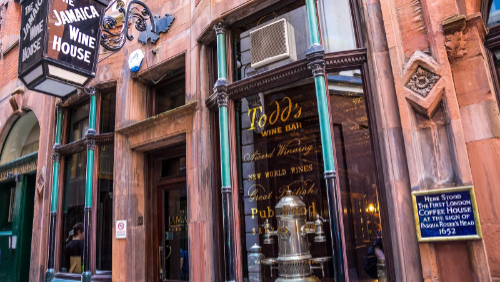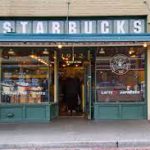Coffee Overtakes Tea in the UK
 According to a report in The Times this week, coffee has overtaken tea as Britain's favourite drink. I wasn't entirely blown away by the statistical evidence which was quoted. To say, as the article does, that shoppers bought more than 533 million packs of coffee compared to 287 million packs of tea, is meaningless. From a pack of ground coffee we might get four cafetieres, but there can be 40+ teabags in a pack. The research company did find that 63 percent of people regularly drank coffee, as opposed to the 59 percent who regularly drink tea.
According to a report in The Times this week, coffee has overtaken tea as Britain's favourite drink. I wasn't entirely blown away by the statistical evidence which was quoted. To say, as the article does, that shoppers bought more than 533 million packs of coffee compared to 287 million packs of tea, is meaningless. From a pack of ground coffee we might get four cafetieres, but there can be 40+ teabags in a pack. The research company did find that 63 percent of people regularly drank coffee, as opposed to the 59 percent who regularly drink tea.

The original Starbucks. Pike Place, Seattle.
I have to say I was surprised at the fact that this would be news. I had it in mind that we were now a nation of coffee drinkers, but that wasn't based on any data whatsoever, just a scan of the average High Street. In fact that is a boom which began as recently as the mid 1990s, when Costa and Caffè Nero opened in Britain. Interestingly we didn't have a Starbucks until 1998, despite it having been founded in 1971. Who can tell me why Starbucks is so called?*
But first to some much earlier history. It seems reasonably certain that coffee originated in Ethiopia. The story goes that a goat herd named Kaldi noted changes of behaviour in his animals when they ate the beans. He tried it himself and things kicked off from there. It apparently began to be used by devoutly religious men to keep them awake to pray deep into the night.
 By the 16th century coffee houses were common throughout the Ottoman Empire, meeting places where men would to discuss business and general gossip. According to Samuel Pepys the first coffee house in the UK was established in Oxford in 1650 by a man named Jacob in the building known as The Grand Cafe, which still exists in the High Street. London had to wait two years for its own one. A blue plaque on Jamaica Wine House in St Michael's Alley in Cornhill marks the spot.
By the 16th century coffee houses were common throughout the Ottoman Empire, meeting places where men would to discuss business and general gossip. According to Samuel Pepys the first coffee house in the UK was established in Oxford in 1650 by a man named Jacob in the building known as The Grand Cafe, which still exists in the High Street. London had to wait two years for its own one. A blue plaque on Jamaica Wine House in St Michael's Alley in Cornhill marks the spot.
As a fashion, the coffee house was a great success. By 1663, there were 83 in the city. Just a decade later Charles II issued an edict to close them all, recanting just two days before it was due to come into force. Probably royal paranoia, fearing that plots were being hatched. Mind you, given the turbulent times, he perhaps had more grounds for suspicion than many of his successors.
Tea wasn't very far behind. Coincidentally its rise was largely due to Charles's wife, Queen Charlotte of Berganza. Daughter of the King of Portugal, she was a tea addict. Royal patronage makes anything fashionable, and the fast expanding East India Company was more than happy to satisfy the new demand. With the the rise of British Empire, and the huge investment in tea plantations, the fortunes of coffee in the UK went into decline.
One hears of the rise of coffee bars in the 1950s and 60s. From what I hear this was more to do with teenage culture and the need for places to hang out than any great love of the product. Getting froth on your coffee and having it served in a cup made of glass might be cool, but I suspect that taste buds weren't being titillated much. I was amazed to learn that instant coffee was first invented in the UK, being patented in 1771. A New Zealander named David Strang claims to be the inventor, in 1890, and a version was apparently popular with the troops in the First World War. It wasn't until freeze drying was developed that things really took off. The value of the global market was recently estimated at $33.4 billion.
As I mentioned, the mid 1990s saw a coffee boom. Now you can't move for coffee shops and artisan roasters. 10 years before that, sophistication was saying that you preferred Gold Blend to ordinary Nescafe. An awful lot of money was spent on advertising. The Gold Blend Couple and their will-they-won't-they story were known by all.
Where do we go from here? I drink much better coffee now than I did, thanks in no small measure to my swish DeLonghi machine which grinds the beans for you. I don't like takeaway coffee; I hate drinking from a disposable cup; and I don't like the prices charged by the chains. But in the UK, the latest recorded annual turnover of Starbucks alone was just over £449 million. Food trends? What do I know?
*Oh yes, the Starbucks name. The three founders met at the University of San Francisco. One was a student of English who loved Henry Melville and Moby Dick. Captain Ahab's ship was called the Pequod, the first name mooted for the business. Sounded a bit like pecker, not ideal for an American audience. Someone suggested that business names beginning with an S were effective. The boys found a random name on a map, a village called Starbo. Still not right, but someone remembered that Ahab's first mate was called Starbuck. The rest, as they say, is history.
The paper didn’t come this AM. This was an informative read, probably better than paper anyway.💕